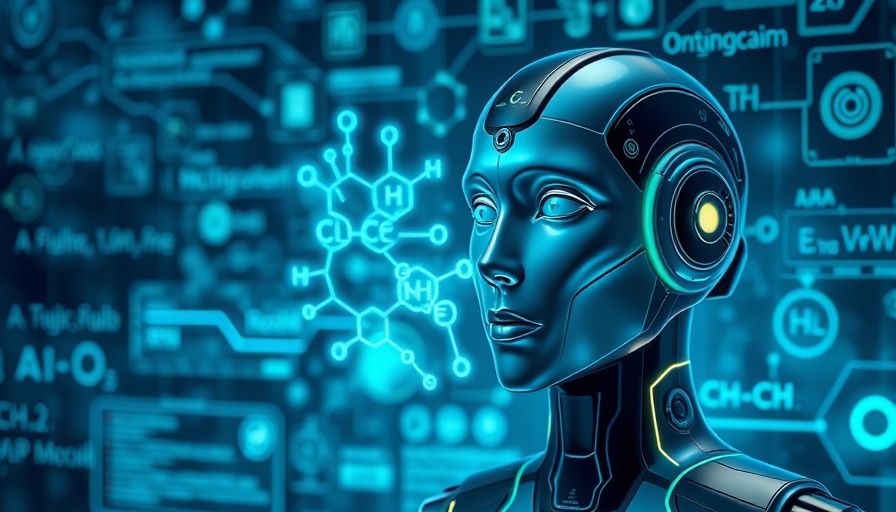
Revolutionizing Computational Chemistry for Everyone
In an era where technology continues to break down barriers, the field of computational chemistry is experiencing a significant transformation. A groundbreaking web platform, known as AutoSolvateWeb, has emerged from Emory University, eliminating the extensive complexities traditionally associated with simulating molecular interactions. This innovative platform harnesses the power of AI through a user-friendly chatbot, enabling even undergraduate chemistry students to configure intricate quantum mechanical simulations simply by chatting.
An Overview of AutoSolvateWeb
Advanced computational approaches have long been the domain of specialized theoretical chemists. The tedious and often complicated processes of molecular simulation have kept this valuable research tool from wider use. However, AutoSolvateWeb opens these doors—relying on cloud infrastructure to ensure that anyone interested in the science of chemistry, including those with minimal experience, can access significant computational resources.
The chatbot streamlines the steps required to set up simulations determining how solute molecules interact with solvent substances, ultimately producing rich datasets for further analysis. As stated by Fang Liu, assistant professor of chemistry and a leading developer of the platform, "It’s like a microscope, giving you an atomic-level view of molecules interacting in a solution." This intuitive design allows users to visualize and understand chemical processes that were previously relegated to experts alone.
A Leap Forward in Education and Research
The implementation of AutoSolvateWeb signifies more than just a technological advancement; it represents a paradigm shift in how chemistry is taught and researched. By democratizing access to sophisticated computational techniques, the platform paves the way for improved educational outcomes in chemistry courses across universities. With its ability to generate 3D simulation videos, students can now engage with complex ideas in new, dynamic ways.
The potential impact on scientific discovery is equally profound. With the ability to create comprehensive datasets on molecular behaviors, researchers can leverage these insights to drive innovation in critical areas such as renewable energy, pharmaceuticals, and environmental science. The broad accessibility of these datasets allows for enhanced collaboration across disciplines, fostering an environment where diverse ideas and perspectives can converge for profound scientific insights.
Future Predictions for Computational Chemistry
Looking ahead, the integration of AI into scientific exploration is only expected to deepen. The trend toward automated systems that simplify complex tasks will continue to expand, offering even greater accessibility to cutting-edge research tools. This evolution raises important questions about how chemists will adapt, and what new educational frameworks will emerge as students become increasingly equipped with these technologies.
As computational chemistry tools become more accessible, the landscape of research could shift dramatically. We may soon see a rise in citizen scientists and interdisciplinary collaborations, with individuals from diverse backgrounds contributing to advancements in chemistry.
Addressing Diverse Perspectives in Scientific Research
While the benefits of democratizing computational chemistry are clear, it is important to consider the challenges associated with this change. As more individuals engage with sophisticated simulations, there will be a growing need for proper training and education to ensure that findings are interpreted accurately. Furthermore, as the demand for fresh perspectives rises, maintaining rigorous scientific standards will be paramount to uphold the integrity of research outputs.
As scientists, educators, and policymakers work together to embrace these advancements, they must remain vigilant to ensure a balanced approach that encourages innovation while respecting established scientific protocols.
Why Understanding Computational Chemistry Matters
For individuals immersed in the world of research or those contemplating a career in science, staying informed about advancements such as AutoSolvateWeb is crucial. By understanding these technologies’ implications and applications, chemists can better position themselves to harness these tools to facilitate their work, accelerate discoveries, and innovate solutions to pressing global challenges.
With technology rapidly changing our educational landscape, now is the time for aspiring scientists to embrace these new instruments and enhance their learning experiences.
In summary, AutoSolvateWeb is more than a tool for molecular simulations; it is part of a larger movement that seeks to transform how chemistry is taught and understood. Its user-friendly approach and potential for broad application promise to foster a new generation of informed chemists who can drive innovation and research across multiple sectors.
 Add Element
Add Element  Add Row
Add Row 



 Add Row
Add Row  Add
Add 


Write A Comment